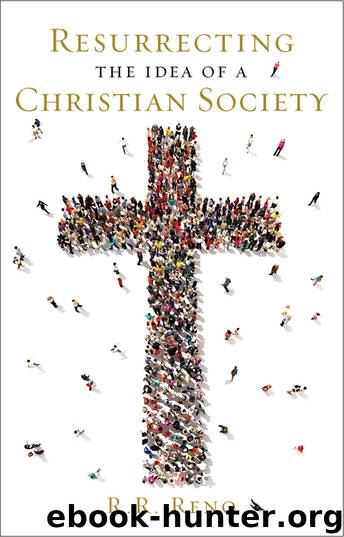Resurrecting the Idea of a Christian Society by R. R. Reno

Author:R. R. Reno
Language: eng
Format: epub
ISBN: 9781621575658
Publisher: Regnery Publishing
Published: 2016-06-24T16:00:00+00:00
RENEWING SOLIDARITY
Friedrich Hayek wrote his classic The Road to Serfdom during World War II in the hope of shaping the postwar reconstruction of society. The West, he believed, faced a decisive choice: to affirm individual freedom or to embrace central planning and socialism. Today, however, our greatest threat is untethered individualism. We’re living in a dissolving society, not a collectivist one.
In the most widely read book by a progressive economist in recent years, Capital in the Twenty-First Century, Thomas Piketty argues that capitalism breeds substantial and growing inequalities. Instead of following up this analysis with a call for socialism or some other collectivist utopia, however, he suggests policies that will save capitalism from its own excesses. You can disagree with every sentence in Capital in the Twenty-First Century, but there’s no disputing that it’s representative of our times. Before the fall of the Soviet Union, we thought we could choose between capitalism and socialism, but that historical moment has passed. Today, progressives are capitalists too.
It’s a mistake to think we face a socialist, collectivist threat. In America, where a pro-capitalist consensus encompasses both parties, the debate about taxes operates within a narrow range. Are we going to ding top earners at 35 percent or 39 percent? This is hardly a culture-defining question of the sort that concerned Hayek. Labor unions exercise less and less influence in our economy. Largely confined to public employees, they are really political action committees angling to capture tax revenue rather than a large-scale movement contesting with owners of capital for economic power.
Global capitalism, far from being hobbled by excessive regulation, unionization, and taxation, has gone from strength to strength over the past few decades, transforming societies throughout the world, especially in Asia. While a free market encourages initiative, innovation, and growth, it also brings creative destruction. From 1950 to 1970, the average earnings of American male workers increased by 25 percent each decade, but since then, men earning the median wage have seen no growth in earnings, even though GDP has doubled since 1975. And as we have seen, the cultural foundations of middle-class life have eroded over the same period.
It is the economic and cultural dissolution of the American middle class that defines our moment in history, not squabbles over tax policy, regulation, and green energy subsidies. There is a growing feeling that the American social contract has been revised. Identity politics spring from the dissolution of the middle class. It’s the Democratic Party’s strategy to find a new basis for a securing governing majority, a rainbow coalition of grievances that will replace the old middle class consensus.
When American conservatives speak of economic freedom today, they can sound irrelevant, even perverse. The free flow of capital, goods, services, and labor is all well and good if you’re one of the winners in the global economy. But what’s in it for the high-school-educated guy in Toledo who has to compete with low-wage workers in Thailand? If the Democratic Party’s enthusiasm for global capitalism is muted, its enthusiasm for lifestyle freedom is at full volume.
Download
This site does not store any files on its server. We only index and link to content provided by other sites. Please contact the content providers to delete copyright contents if any and email us, we'll remove relevant links or contents immediately.
| Anarchism | Communism & Socialism |
| Conservatism & Liberalism | Democracy |
| Fascism | Libertarianism |
| Nationalism | Radicalism |
| Utopian |
The Secret History by Donna Tartt(16618)
The Social Justice Warrior Handbook by Lisa De Pasquale(11489)
Thirteen Reasons Why by Jay Asher(7786)
This Is How You Lose Her by Junot Diaz(5764)
Weapons of Math Destruction by Cathy O'Neil(5034)
Zero to One by Peter Thiel(4823)
The Myth of the Strong Leader by Archie Brown(4789)
Promise Me, Dad by Joe Biden(4444)
Stone's Rules by Roger Stone(4415)
Beartown by Fredrik Backman(4412)
How Democracies Die by Steven Levitsky & Daniel Ziblatt(4396)
The Fire Next Time by James Baldwin(4340)
100 Deadly Skills by Clint Emerson(4075)
A Higher Loyalty: Truth, Lies, and Leadership by James Comey(4031)
Rise and Kill First by Ronen Bergman(4012)
The David Icke Guide to the Global Conspiracy (and how to end it) by David Icke(3880)
The Farm by Tom Rob Smith(3871)
Secrecy World by Jake Bernstein(3782)
The Doomsday Machine by Daniel Ellsberg(3730)
